Singapore sailor Cecilia Low trades medals for meetings, wins over corporate leaders with ‘can do’ attitude
Cecilia Low has been sailing as a professional athlete since she was a teenager. She was looking to get her foot into the corporate world, but something else came her way to lead her back to the open sea.
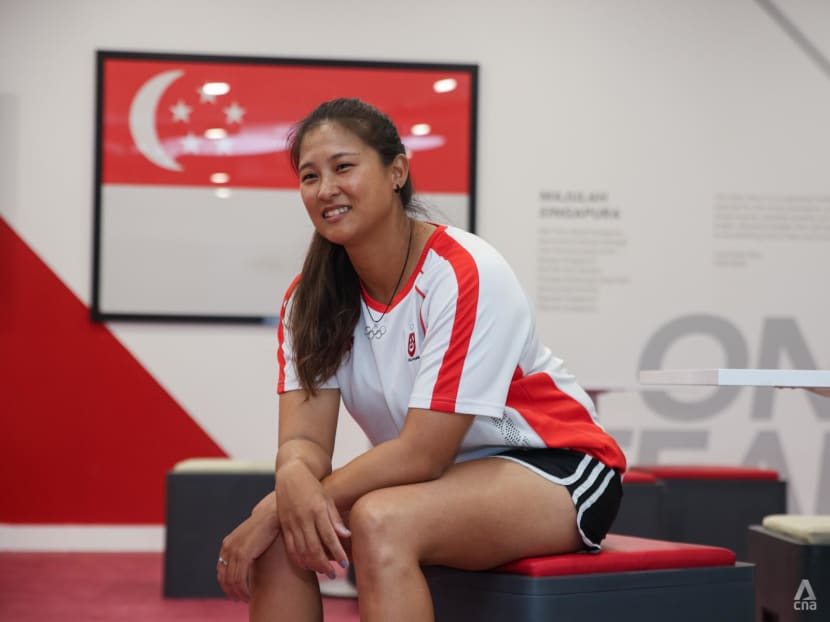
National sailor Cecilia Low photographed on Mar 19, 2025. (Photo: CNA/Nuria Ling)

This audio is generated by an AI tool.
At 34 years old, national sailor Cecilia Low is charting new waters not just on the open sea, but in her first internship at a corporate firm.
In January, she joined professional consultancy firm Deloitte – one of the “Big Four” global accounting and professional services firms in Singapore – at an age when many of her peers would already be a decade into climbing their career ladders.
“When you’re a student, you will already have a few different internships on your resume before university. But for us (athletes, we have) nothing, it’s just sporting achievements the whole time,” she said.
Having started a professional sporting career as a teenager, she has had more than two decades of sailing experience with various teammates.
Among her achievements are clinching the world championship in the women’s 420 class in 2012 and becoming one of the first Singaporeans to take part in a sailing medal race at the 2020 Japan Summer Olympics.
When she and her teammate did not qualify for the Paris Olympics in May last year, Low stopped sailing for two months and shifted her focus to finishing a aeronautics degree programme from the United States-based Embry‑Riddle Aeronautical University, which has a campus in Singapore.
One requirement for graduation was completing an internship, but securing a corporate role as an athlete with an unconventional career path was not all smooth sailing.
It is a reality faced by many professional athletes who went all out in their younger days to pursue sporting excellence, but now hope to pursue other career options as they grow older.
That is why there are programmes such as the Sports Excellence Career Scheme (spexCareer), an initiative by national sports governing body Sport Singapore that helps national athletes secure internships, apprenticeships and job placements.
When she failed to land an interview after countless applications, the programme helped Low land an internship at Deloitte Singapore, one of the partners of spexCareer that offers flexible internships for Team Singapore athletes while accommodating their sporting commitments.
This allowed her to balance work deadlines with twice-a-week gym sessions during office hours and weekend training on the open sea.
When I met Low at the Sport Singapore gym last month, the gap between us couldn’t feel greater: I was recovering from a mild flu, while she was effortlessly deadlifting close to 100kg of weights, which is not even the maximum she can lift.
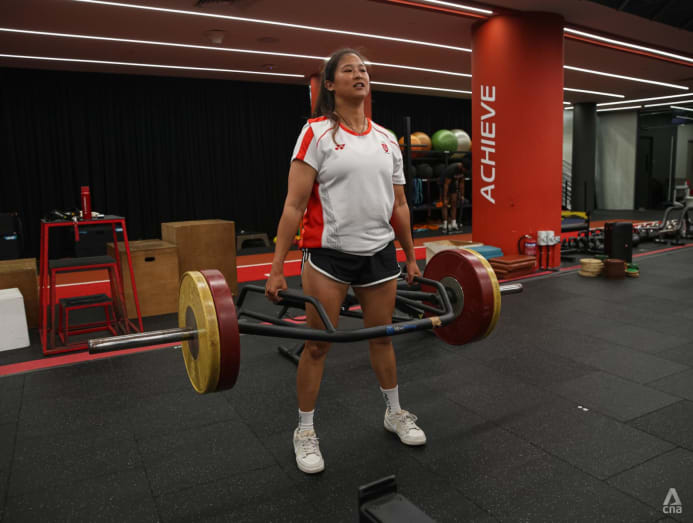
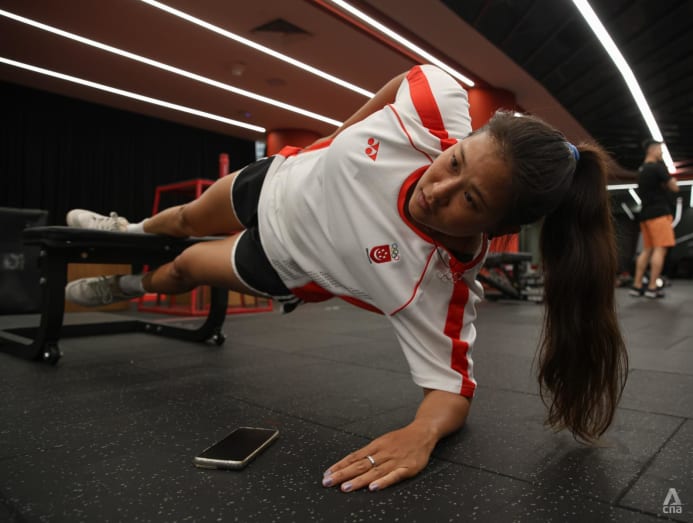
Watching from the side, I jokingly said: “I think trying to lift that would kill me right now.”
She smiled amiably and replied that maintaining peak physical condition had simply become a part of her life.
Does this stamina come in handy when adjusting to corporate life?
Not quite. It had tested her endurance, she said.
The interview with CNA TODAY was squeezed between her regular mid-week gym session and a work meeting at her office in the central business district.
She continued: “You sail when the sun (comes up), so you don't wake up that early, just around 9am for training.
"Now I have to wake up at 7am to get to the office by 8.30am and I feel tired like how ‘corporate people’ feel. You get drained by the end of the work day and have little energy left to do anything else.”
Summing it up, she said: “It takes a different toll on your body. Sport is physically draining, but you get used to it ... I'm (still) not used to corporate life.”
Nevertheless, this stint has gone by "super quick" and her three-month internship is coming to a close this month.
Corporate life has taught her valuable lessons and she may one day return to it full-time.
For now, though, she is keeping her options open and turning to a new sailing discipline.
In between preparing slides for presentations at work, she was learning to be a kitefoiler.
Being an Olympian in the 49er FX class of sailing, moving on to formula kite in her 30s with the same goal was certainly not something she had planned.
It perhaps helped that her office window on the 34th floor of OUE Downtown overlooks the waters of the Marina Bay area and Singapore Strait.
“I still have the spark to do more, I still want to be on the water,” she added.
“ALL-IN” FROM A YOUNG AGE
Low was first introduced to sailing at eight years old alongside her sister, when their parents signed them up for sailing lessons.
A coach quickly scouted the pair, having seen that they showed talent for the sport.
“I didn’t like it in the beginning because it was a bit scary and I was small," Low recalled. "I was very skinny and weak and I couldn’t even climb into the boat.”
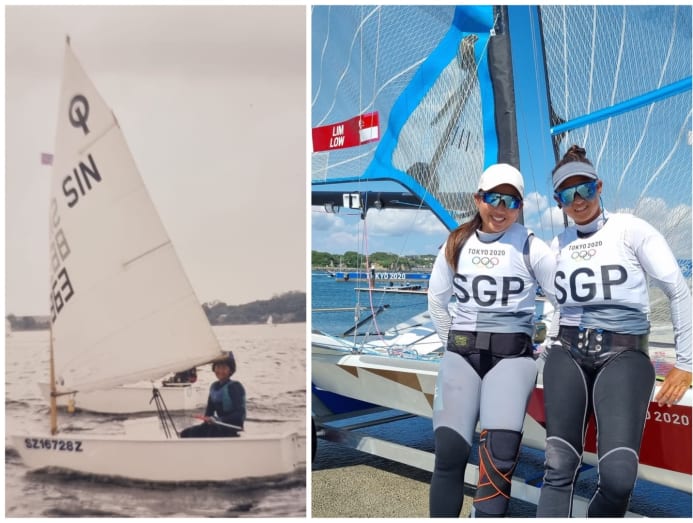
However, she soon grew to love the sport, qualifying for the national team at the age of 12 and securing a place in the Singapore Sports School in 2004.
She never gave much thought to whether sailing was what she would be doing for the rest of her life. She was just encouraged to go “all in” by her parents.
“Once in a while, I would think, ‘Am I making the right choice?’, because it was unchartered territory, (a path that) not many people had taken.
"I’m not from a well-to-do family, so (even then I knew) there is not much to fall back on.
“But my mum always said, if you do things half-heartedly, the chance of failing is higher.”
As she pursued the sport, she was supported by understanding teachers since she had to defer her studies, including during her polytechnic days when she had to pause schooling during her first semester and second year while doing a diploma course on aerospace aviation.
For more than a decade, she was travelling in and out of Singapore for training and competitions and life was structured around the sporting calendar.
She mostly trained in Europe where the winds were better suited for the sport and she would spend around two months a year back home.
“Being a top athlete, you don’t have days off. Even if you do, you need to be resting.
"Even during Chinese New Year, you go visiting and then you go train. I've missed occasions such as birthdays and weddings,” Low said.
Over the years, she has competed around the world and has taken part in the Asian Games, Southeast Asian Games and Olympics. She did so with various partners, some of whom have left the sporting life behind now.
With long-time sailing partner Kimberly Lim, the pair won gold at the 2018 Asian Games and a bronze in the 2023 Asian Games.
They clinched a 10th-place finish at the Tokyo Olympics in the women's 49er FX event, becoming Singapore’s first sailors to qualify for an Olympic medal race.
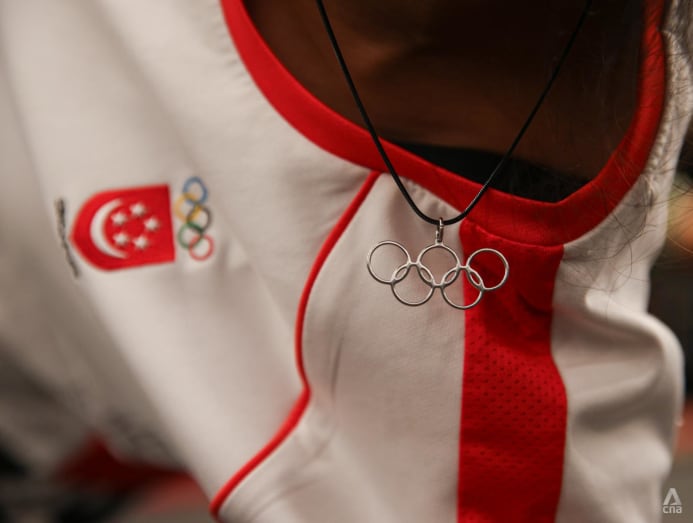
Looking at her achievements, I began to understand why she initially felt like a fish out of water when she had to adapt to a more sedentary office life.
In her role focusing on aviation clients as part of Deloitte Singapore's transportation, hospitality and services team, Low is mostly deskbound.
She was assigned to prepare proposals and research trends in the aviation sector for an upcoming publication.
“I didn’t use to stare at a computer from 8.30am to 5.30pm, so that took some getting used to.”
While I can imagine how sore I would be if I were plunged into a sporting career, Low said that she has had body aches "out of nowhere" since she began deskbound work.
To counter this, she takes short walks around the office as a way to do some stretching and stay active during the day.
AN UNWAVERING "CAN DO" ATTITUDE
One advantage was that being accustomed to the goals and schedules of a sporting life, she was not all that fazed by the fast-paced, project-based nature of her consulting work.
It is a field that she is keen to eventually return to after the paid internship should the opportunity arise.
Mr Thomas Pellegrin, who is leader of the transportation, hospitality and services sector at Deloitte Southeast Asia, said that Low fared “exceedingly well” during her internship.
She was highly independent and resilient and she flexed her mental muscles with “out of the box” thinking. These were traits that he saw as being honed by her athletic career.
“From day one, she displayed an eager team spirit and unwavering ‘can do’ attitude,” Mr Pellegrin added.
Since 2015, Deloitte Singapore has employed more than 160 athletes under the Deloitte Ignite programme tailored for elite athletes, both current and retired.
Mr James Walton, sports business group leader at Deloitte Asia Pacific, said that the programme seeks to demonstrate support to national athletes who make sacrifices and commitments while representing Singapore, offering them a pathway to a second career in professional services.
“The athletes themselves generally bring diverse thoughts and experiences to the organisation. They are high achievers who practise excellent self-discipline, prioritisation and time management.
"They also demonstrate creativity, problem-solving, teamwork and independence,” he added.
GETTING BACK IN THE WATER
As she was serving her internship, Low was also dipping her toes into an entirely different field: Kitefoiling.
Singaporeans became familiar with this watersport in the past year due to teenage kitefoiler Maximilian Maeder, who clinched a bronze medal for the country at last year’s Paris Olympics.
Maeder’s parents and the team from the Singapore Sailing Federation, who hope to grow the sport in Singapore, gave Low the idea and opportunity to try kitefoiling professionally.
It was not an easy decision for her to get back in the water.
She disclosed: “I was going to quit sport after we didn't make it (to the 2024 Paris Olympics) in May. I was very tired due to the many Olympic campaigns.
"I did the Olympic campaign for 10 years and it was very mentally draining. You try to do things in a different way but it’s quite hard to keep going when you keep hitting a wall.”
However, she soon found herself coaching others in sailing part-time while completing her degree and seeing her students on the water motivated her to start sailing again, eventually leading her to accept the Maeders’ offer to try kitefoiling.
Although there are transferable skills from her decades of sailing, Low said that the two sports are “very different”.
For instance, she is used to sailing with a crew of two, but in kitefoiling, she rides solo.
She also had to master standing on a board that is about a metre-long while controlling a kite.
In her early days of trying the sport, she accidentally stepped on the hydrofoil, a wing-like structure that lifts the rider above the water's surface. It sliced her toe open and she needed six stitches.
She recovered fully and pushed on, so much so that she has been receiving positive feedback from her kitefoiling coach about the strides she has made and that she has picked up skills faster than most first-timers.
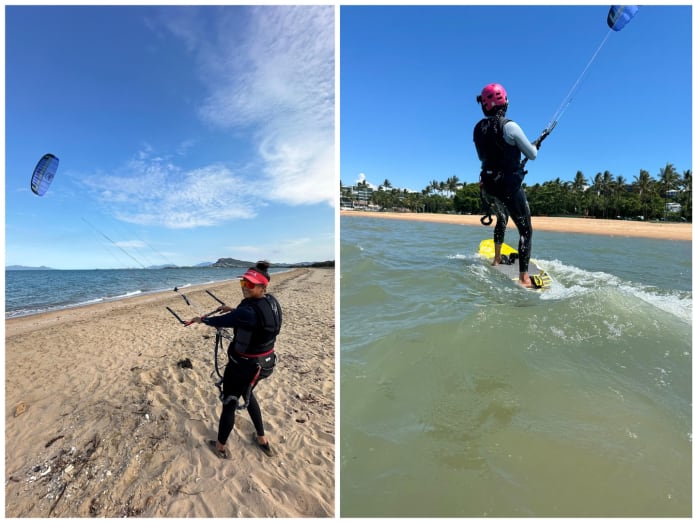
Her next goal is working towards competing in the formula kite class at this year’s Southeast Asian Games, which is set to happen this December in Thailand.
“I’m on the edge of being excited and nervous at the same time, because I’m not sure if I can live up to expectations. But I am going to at least give myself these six months and see how far I can get.”
Low knows that the choices she has made so far were “never straight or linear”.
Her resume, for example, now has an internship in a consultancy firm nestled among the sporting achievements.
“I’m quite happy with how my life has turned out so far. I had my successes and there've been ups and downs for sure.
“But all in all, I’m really proud of my sporting career and hope that others will give their dreams a go.”














